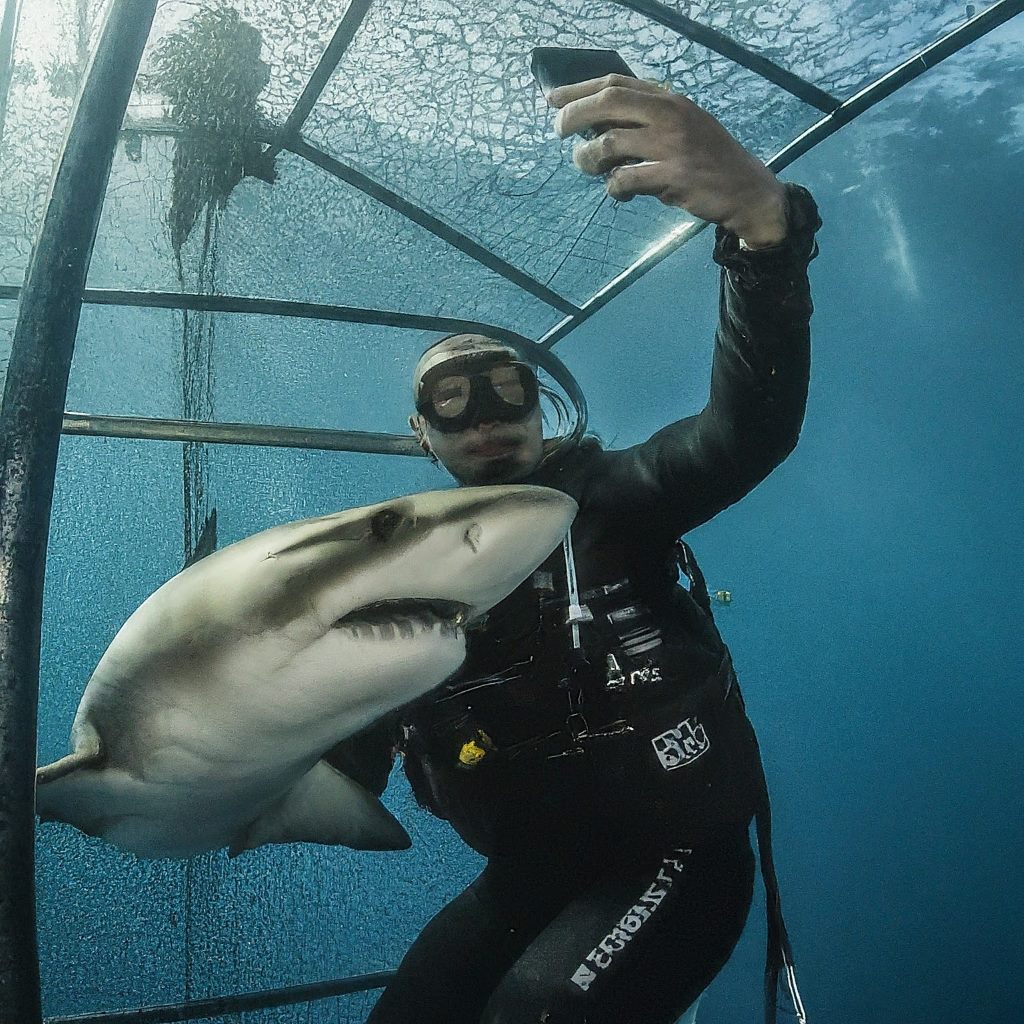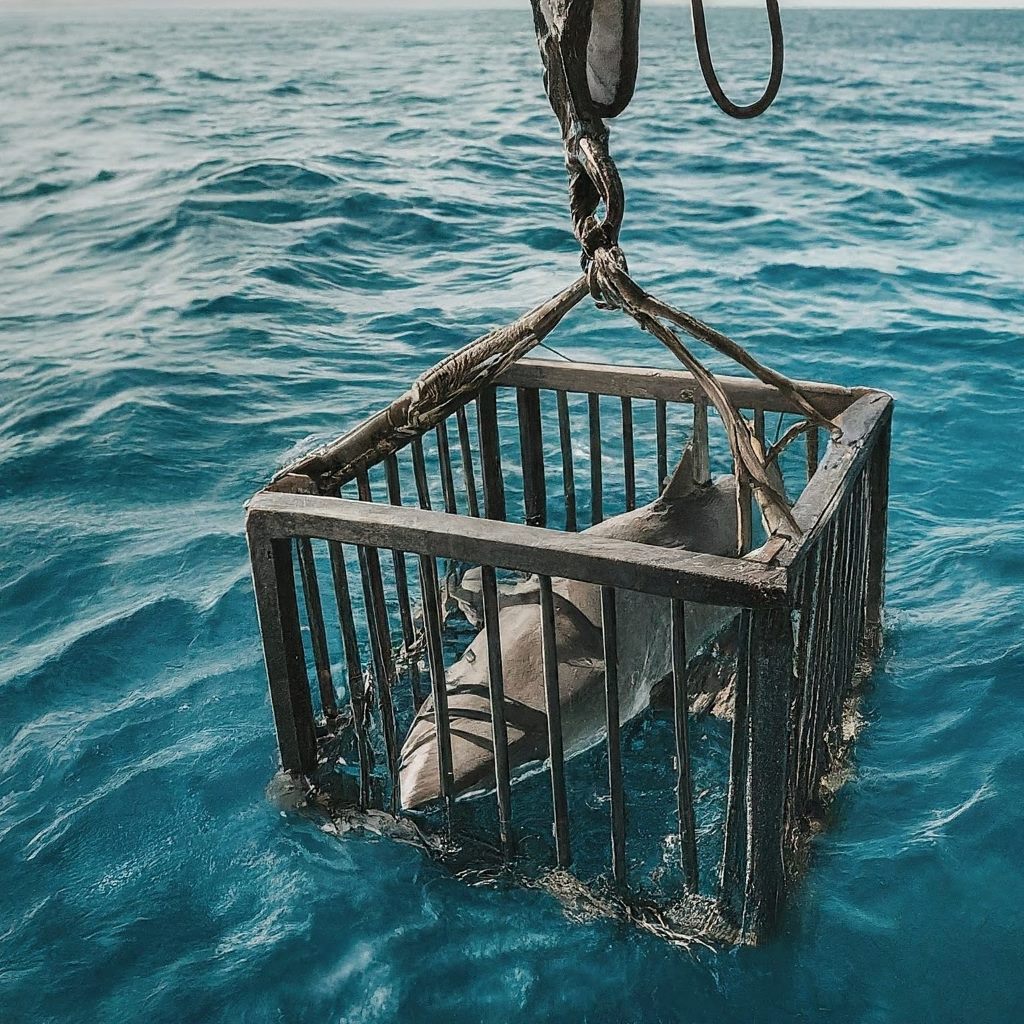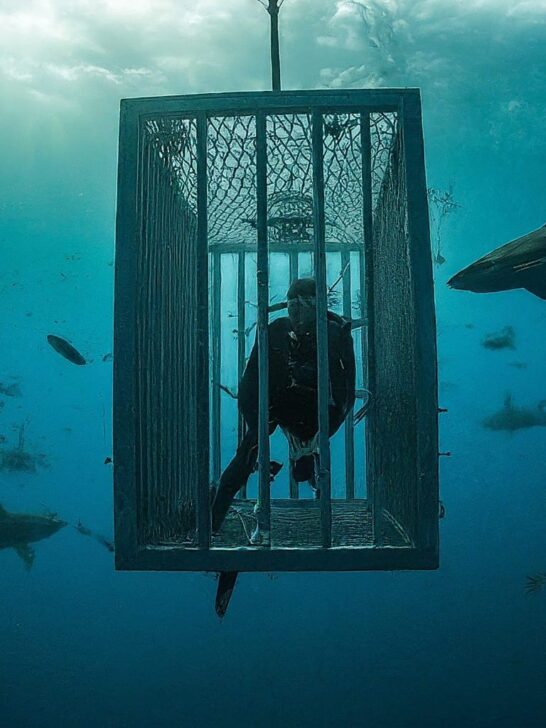Shark cage diving has emerged as a thrilling adventure activity that allows individuals to get up close and personal with one of the ocean’s most feared and misunderstood predators—the shark. This unique experience, however, is not without its controversies and raises important questions about the impact on shark behavior, the ethics of human-shark interactions, and the role of shark cage diving in marine conservation efforts.
While shark cages can be a safe way to experience the thrill of being in the water with sharks, it is important to remember that there is always a risk involved. Shark attacks are rare, but they do happen. It is important to choose a reputable company that uses safe and well-maintained shark cages. You should also follow all of the safety instructions provided by your tour operator.
Are Shark Cages Safe?
Shark cage diving is generally considered a safe activity.There have been no recorded fatalities due to shark attacks during cage diving excursions. The cages used are designed to be robust and secure, protecting divers from potential harm. However, it’s important to note that like any outdoor activity, there are inherent risks involved.
Factors to consider regarding shark cage diving
Operator Experience and Safety Protocols:Choose a reputable operator with a proven track record of safety and adherence to industry standards.
Cage Construction: Ensure the cage is made of high-quality materials and is designed to withstand the pressure and impact of sharks.
Weather Conditions: Avoid cage diving during rough weather or when there are high shark activity levels.
Shark Species: Some shark species, like great whites, are more curious and may interact more frequently with the cage. Be aware of the specific species you’ll be encountering.
Follow Guidelines: Always follow the instructions and guidelines provided by your tour operator, including staying inside the cage and avoiding touching the sharks.
While shark cage diving is generally safe, it’s essential to exercise caution and choose a reputable operator to minimize risks and maximize your enjoyment of this thrilling experience.
The Adventure of Shark Cage Diving

1. Overview of Shark Cage Diving:
Shark cage diving involves the submersion of a reinforced cage into the ocean, allowing divers to safely observe sharks in their natural habitat. Popular locations for shark cage diving include areas known for high shark populations, such as South Africa, Mexico, Australia, and the United States.
2. Species Encountered:
Divers often have the opportunity to encounter various shark species, including the Great White Shark, Tiger Shark, Bull Shark, and more. The chance to witness these apex predators in action has turned shark cage diving into a sought-after adventure for thrill-seekers and wildlife enthusiasts alike.
Controversies Surrounding Shark Cage Diving
1. Impact on Shark Behavior:
Critics argue that shark cage diving can alter the natural behavior of sharks. The presence of bait and human interaction at the water’s surface may lead to conditioned behavior, associating humans with a potential food source. This can have unintended consequences for both sharks and the ecosystems they inhabit.
2. Baiting Controversy:
One of the most contentious aspects of shark cage diving is the use of bait to attract sharks to the vicinity of the cage. While this ensures close encounters, it raises concerns about the potential disruption of natural feeding patterns and the ethical implications of habituating sharks to associate boats with food.
3. Ecotourism vs. Exploitation:
The line between responsible ecotourism and exploitative practices can be thin. Some argue that well-managed shark cage diving operations contribute to conservation awareness and fund marine research. However, others caution against the negative consequences of turning sharks into tourist attractions.
Conservation Perspectives

1. Economic Benefits for Conservation:
Proponents of shark cage diving argue that it can be a valuable tool for conservation efforts. Economic incentives generated by the industry may contribute to local economies and, in turn, fund shark research, conservation projects, and marine protection initiatives.
2. Education and Awareness:
Shark cage diving experiences often come with educational components, providing participants with insights into shark biology, behavior, and the importance of shark conservation. Advocates believe that fostering understanding and respect for sharks can contribute to their preservation.
Regulatory Framework and Best Practices
1. Industry Regulations:
Several countries and regions have established regulations to govern shark cage diving activities. These regulations may include guidelines on cage construction, permitted baiting practices, and the proximity of interactions with sharks. Adherence to these regulations is crucial for minimizing negative impacts.
2. Best Practices for Responsible Shark Cage Diving:
Responsible operators prioritize the safety of both participants and sharks. This includes employing experienced guides, using eco-friendly baiting practices, and implementing measures to prevent negative behavioral changes in sharks. Best practices aim to strike a balance between adventure tourism and conservation.
Future Challenges and Opportunities
1. Research Needs:
Addressing the controversies surrounding shark cage diving requires ongoing scientific research. Understanding the short-term and long-term effects of cage diving on shark behavior and ecology is essential for formulating informed conservation strategies.
2. Community Engagement:
Involving local communities in decision-making processes and ensuring that economic benefits from shark cage diving directly contribute to conservation and community well-being can create a more sustainable model.
Shark Cage Diving Final Verdict
Shark cage diving stands at the intersection of adventure, controversy, and conservation. As enthusiasts seek the adrenaline rush of encountering sharks in their natural habitat, it is crucial to navigate the ethical considerations and environmental impacts associated with this activity.
By embracing responsible practices, promoting education, and contributing to marine conservation efforts, the shark cage diving industry has the potential to play a positive role in fostering a deeper appreciation for sharks and their vital role in maintaining the health of our oceans. As we tread these waters, a delicate balance must be struck to ensure that the awe-inspiring adventure of shark cage diving aligns with the broader goals of marine conservation and sustainable ecotourism.
Related FAQ’s About Shark Cages
I. How Dangerous Is Cage Diving With Sharks?
Shark cage diving is generally considered a relatively safe adventure activity when conducted by reputable and experienced operators. The primary risks are associated with the unpredictability of wild animals and the inherent dangers of being in the open ocean. Safety measures, such as reinforced cages and expert guides, are implemented to minimize potential hazards.
II. Can Sharks Break Through Shark Cages?
Shark cages are designed and constructed with reinforced materials to withstand the force of shark encounters. While rare, there have been instances where sharks, particularly larger species like the Great White Shark, have been able to damage or breach cages. However, these occurrences are exceptional, and modern cage designs prioritize both diver safety and shark well-being.
III. Is It Safe To Go In A Shark Cage?
When operated by licensed and responsible professionals, shark cage diving is generally considered safe for participants. The use of sturdy cages, strict safety protocols, and experienced guides contributes to a controlled and secure environment. Participants are provided with thorough safety briefings, and equipment undergoes regular inspections to ensure optimal safety standards.
IV. Has Anyone Been Attacked In A Shark Cage?
While incidents of shark attacks within shark cages are extremely rare, there have been isolated cases where sharks have breached cages or exhibited aggressive behavior. These incidents often result from unpredictable shark behavior rather than intentional aggression. Injuries to humans inside cages are infrequent, and fatalities are exceptionally rare.
V. Is Shark Cage Diving Cruel?
The ethics of shark cage diving are a subject of debate within the conservation and animal welfare communities. Proponents argue that responsible shark cage diving can contribute to conservation awareness and generate funds for shark research. Critics, however, contend that the practice may habituate sharks to associate humans with food, potentially disrupting natural behaviors. The industry’s impact on shark populations and ecosystems is an ongoing area of scrutiny.
VI. Can Sharks Break Steel Cages?
Sharks, particularly large and powerful species, can exert significant force. While shark cages are constructed from reinforced materials, including steel, it is theoretically possible for a determined shark to damage or breach a cage. However, modern cage designs prioritize strength and durability, and instances of sharks breaking through steel cages are extremely rare.
VII. Why Do Sharks Not Bite Scuba Divers?
Sharks generally do not perceive scuba divers as prey. They rely on various senses, including vision and electro-reception, to identify potential food sources. The presence of scuba gear and the diver’s posture usually signal to sharks that humans are not natural prey. Additionally, sharks are often more curious than aggressive when encountering divers, and most species do not see humans as suitable targets for predation
